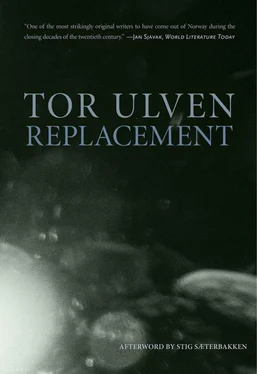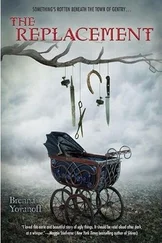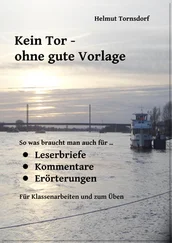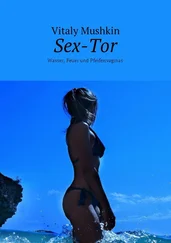They sail past the bend, followed by a squadron of smaller boats full of people who wave at them as they pass, and the men on the beach shade their eyes and point, probably discussing the ship, the sails, its age, and so on: an antique ship, maybe what they call a brig, with tan sails. “Age, and so on,” he’s at least fifteen years older than you, you think, which puts him at about fifty or so, a geriatric captain setting sail through sixty, seventy, eighty, ninety mediocre years, your grandmother’s about to turn ninety-three, you remember, at this point she’s half blind and deaf, her head quivers, her hands shake, she has bursts of anger, then bouts of apathy, bursts of anger, then bouts of apathy, and so on, but at least she’s always willing to lend you money, it’s not like she needs it, she doesn’t know the difference between a hundred kroner bill and a sheet of toilet paper, you think, a one-hundred-and-five-year-old geriatric captain, a skeletal helmsman on a decrepit vessel sailing through the depths of the earth with lanterns extinguished, destination unknown.
You feel strangely sober, and you suppose you should do something about that, because the liquor is top shelf and free to boot. The smell of grilling meat wafts up from the beach; the men who set up the bonfire, as well as a few women, who must be wives or girlfriends or roommates or something, seem to be preparing food. You watch them through a blue-tinted, alcohol-induced haze, which has a slight distancing effect, and they don’t look like actors in a film, but rather like bystanders in a television news report (where a CEO or a politician or a bishop or a hockey coach has a padded microphone shoved in front of his face, while random, superfluous people go about their business in the background, shoveling snow, window shopping, eating ice cream, feeding the ducks, cycling, carrying packages, slamming car doors, pushing carts, leaning on canes, kicking soccer balls, holding briefcases, and so on; it’s only children and insolent teenagers who intrude into what you might call the camera’s private space by staring into the lens, making faces, and carrying on, which diverts attention away from whatever the CEO or politician or bishop or hockey coach is saying, but still, the majority of the people in the picture are only present as so-called chance passersby (as every person’s life, when viewed from his own perspective, is filled with chance passersby), and neither the questions asked nor the answers given are of any more concern to them than a newspaper article is to the fly that just happened to land on it). You’ve got about a fourth of a bottle left. There’s plenty more where that came from.
Flames. And in the distance, coming at you as if from a long tunnel, accordion music, sirens, fireworks, and laughter. And boats: thumpthumping motor boats, noiseless sailboats, dinghies, and so on, all blazing with lights, you see green starboard lights on boats leaving the sound, red port lights on boats entering the sound, and white lights ranging from bright to dim on all boats; it’s an orderly confusion of boats, as if an evacuation, or at the very least a regatta, were taking place in the mild midsummer night’s darkness. The smell of grilling meat continues to waft up from the beach. You realize you’re hungry. You’re also freezing, exhausted, and you have a pounding headache, and each separate discomfort pokes at you like a sadistic surgeon as you wake from your drunken doze, although (thank your lucky stars) you aren’t quite sober, and you notice that your own fire still isn’t lit; so go on and light it, you think. When you stand to piss (and feel drops of warm urine bouncing off the flagstones and splashing against your legs), you remember something you dreamed, it seems so obvious, it’s absolutely the right thing, you think, and you head for the cabin door, which is still open. Buck naked, you grab a bottle, any bottle at random (this time without examining your top-shelf options) and guzzle it, trying to get down as much as you can, though unfortunately it goes down the wrong pipe, so you end up spewing about half of it out (obviously you couldn’t take that much), but you take another swig, gulping it down as quickly as possible, gasping and choking and spewing it out again, until half the bottle is gone, and then, without missing a beat, you grab another bottle from the shelf, open it, walk into the bedroom and empty its contents over the bed in one expansive, sweeping motion before piling up the bedclothes, soaking them with more alcohol, and striking a match.
The bonfire on the beach rages unchecked, the flames whipped toward the water by seaward winds, it periodically gives you goose bumps, you’re naked, your hair is blowing in your eyes, you recall once again that your bonfire is still unlit, but you’re cold, you’re hungry, you drift slowly, almost instinctively, though at least on your own two feet, toward the blazing warmth down on the beach, toward the accordion music too (which, after a last measure, falls silent, so that you can clearly hear the noise made by the large crowd), but mainly toward the glowing bonfire, which will warm your body, and towards the smell of grilled meat, which will nourish it.
The landscape is dark, or half-dark, or a quarter-dark, a mild summer darkness, which means that all contours, all surfaces retain a reflection of the day just past, an unvarying quantity, a dawn (or a dusk) that lasts all night. The pause in the music extends. It seems endless. Sea birds shriek. A group is singing in chorus, though one person is off-key. You hear a car approaching behind you, its lights crawl up your back, pass you completely, stop, turn, and then shine right in your face. Blinded by light, you toast the car with your bottle, before continuing on. When normal sight returns, you see that it’s still a clear summer night; as you walk, the only anonymous shadows are the rocks at the water’s edge and the shapes backlit by the bonfire, as if they’ve been molded from a compact darkness, a darkness as black as the burnt bottom of an old frying pan, black as the pupils of your eyes (one could therefore say that you see the world darkly), all you can see in the mirror is the very top of the candle, a wick and a tall flame shooting upward like a bulb in springtime. Because the mirror is positioned against the wall, tipped slightly back so that it won’t fall over, the flame’s reflection is at a forward (or oblique) angle to the actual candle (directly in front of the mirror), and it looks like what you might (paradoxically) call the mirror’s interior is made up of another space, which has its own light, similar but not identical to the first, real one.
If you look closer, you notice that the candle has a glowing, horizontal ring around its top, or rather, around the wick, where the flame illuminates the wax, that is, right before it melts it down, and furthermore, that the wax running down the length of the candle glistens like snow covered with a thick layer of ice, although that’s only true of the rear of the candle, which you can see in the mirror, probably because the smooth (mirror) surface is casting a reflection back onto the candle, while the candle’s front (which you can’t see in the mirror) is nearly as dark and colorless as the imaginary space contained within the mirror itself — that is, aside from the illuminated wax (on top) and the glistening reflection along the candle’s length (below). The wick is a dark space (as dark as the mirror’s surface) within the innermost part of the flame, which is surprisingly tall, taller than the candle itself (the candle probably hasn’t been trimmed in a while, since the woman who should’ve done it got lost in thought and forgot all about it); it looks like the flame, with its tall, slender, yellow-white (red-tipped) fluctuating form, is lapping at the mirror’s extravagant and costly frame, which is gilded (or, rather, silvered, red-washed) by the light; and why, you wonder, interrupting your visual meditations, are you studying that painting with a mirror so closely? Why are you interested in paintings anyway? Is it because you see yourself in them? No. It’s because it saves you from having to look into a real mirror, and having to see that face, the face that could belong to any thirty-nine-year-old, unmarried man, the face that’s no longer yours after seven plastic-surgery operations, but is instead a cheap imitation or a bad caricature of your face. In paintings, you yourself are absent.
Читать дальше












